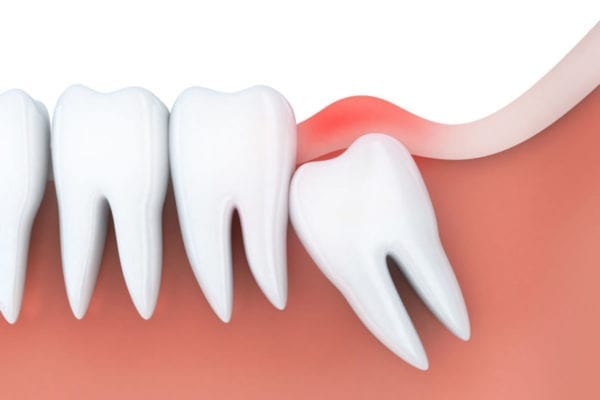Wisdom Teeth
WISDOM TEETH
WHAT ARE WISDOM TEETH?
Wisdom teeth are the third and final set of molars to erupt. They generally erupt in late teens or early twenties. Sometimes they are well aligned to adjacent teeth and don’t generate any oral problem, but most of the time there isn’t always enough room in the mouth for them to erupt properly.
Because of the lack of space, wisdom teeth can sometimes emerge at certain angulation or get stuck on bone causing them to just partially emerge and in this cases they require removal.
Nine out of ten people have at least one impacted wisdom tooth.
WHY ARE WISDOM TEETH REMOVED?
Sometimes wisdom teeth that are impacted in the jaw bone or haven’t fully erupted in the oral cavity can cause dental problems. It is very common that food and bacteria get trapped around the gum of wisdom teeth because this area is very difficult to clean, if impacted wisdom teeth are left in the mouth it may cause:
- Bacterial infection
- Pericoronitis: Infection caused by plaque on the tissue surrounding the tooth.
- Cellulitis: Infection that has spread to the cheeks, throat or tongue.
- Abscess: Pus formation in the surroundings of the wisdom teeth (gum, bone or teeth) due to a bacterial infection.
- Tooth decay
- Gum disease
- Cyst or tumor formation: Sometimes wisdom teeth that does not erupt in the oral cavity develop a cyst or benign tumor. If this grows it may lead to more serious problems; damage in the jaw bone, nerve or teeth.
- It can affect adjacent molar: by reabsorbing its root causing extraction of this one.

HOW DO I KNOW IF I NEED MY WISDOM TEETH REMOVED?
You need to make an appointment with your dentist if you are having discomfort or pain in the molar area.
The dental professional will check your general and dental background and also take x-rays, he will do a clinical checkup and advice if your wisdom teeth need to be removed.
Tell your dentist if you have or had any of the following conditions:
- Allergies to any medication
- Congenital heart defect
- Diabetes
- Liver disease
- Osteoporosis and if you are taking Bisphosphonates
- Impaired immune system
- History of bacterial endocarditis
HOW ARE THEY REMOVED?
Your dentist may remove your wisdom tooth if its fully erupted because it can be extracted as simply as any other tooth, or, they may refer you to an oral and maxillofacial surgeon for hospital treatment depending on the difficulty level.
Before the procedure, your dentist will explain how the surgery is, and will also give an informed consent for you to sign; in which he explains the procedure and its possible complications. Depending on your case in particular he may give you antibiotics before or after surgery.
Some people get nervous with the procedure, so an option is to be sedated for a tooth extraction. Sedation in dentistry include oral sedatives, intravenous sedatives (It is administered to your veins by injection), or nitrous dioxide.
At the moment of extraction your dentist will give you a local anesthetic injection to anesthetize the area surrounding the tooth.
It is normal to feel some pressure at the time your dentist is removing the tooth or after.
It is necessary to make an incision in the gum sometimes, and the tooth may need to be cut into smaller pieces in order to be removed.
The procedure takes about 20 minutes or more, depending on the severity of the case.
WHAT POST-OPERATIVE CARES SHOULD I TAKE?
After the extraction, your dentist will send you home to rest. Recovery typically takes between 3-4 days depending on severity of the surgery. There are some methods you can take at home that can help minimize discomfort, swelling, risk of infection and speed recovery:
- Take painkiller as prescribed by dentist
- Apply ice to the affected area immediately after the procedure to minimize swelling.
- Do not rinse your mouth for the first 24 hours after the procedure.
- Have a liquid diet (soup, pudding, yogurt, milkshakes, ice cream, milk, fruit juice) the same day and the day after the extraction and gradually add solid diet as the extraction site heals.
- Limit activity for the next day or two.
- Do not use straws for the first 24 hours.
- Avoid smoking
- After 24 hours, you can rinse your mouth with homemade water-and-salt washes (1/2 teaspoon of salt and 8 ounces of water)
- Brush your teeth and tongue normally, also floss, avoiding the extraction site.
WHAT ARE THE POSSIBLE COMPLICATIONS OF WISDOM TEETH SURGERY?
- Incomplete extraction (parts of the tooth remain in the socket)
- Damage to adjacent teeth
- Pain associated to chewing or mouth opening.
- Fractured jaw
- Nerve injury; which can cause a numb sensation in your tongue, lip, chin, teeth and gums. This is usually temporary but it can be permanent in some cases.
